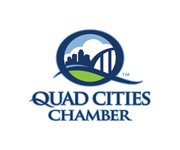The Rock Island Port District, funding for Destination Iowa, new property tax reforms and changes to eligibility for youth employment were among the wins for business during the recent Illinois and Iowa legislative session.
That’s according to the Quad Cities Chamber, which tracks legislation and advocates before state lawmakers on behalf of its members and the Quad Cities business community.
QC legislative victories
The following is an abbreviated list of the action the Illinois General Assembly and the Iowa Legislature shared recently by Chamber leaders:
- Rock Island Port District: The law creates a new entity that can receive new funding to invest in the Rock Island community. It includes projects from road development and improvements to river commerce. The bill passed both houses in Illinois and is expected to become law.
- Health Benefits for Immigrant Adults: The law, which originally was passed by the Illinois General Assembly in 2022, underwent significant changes due to unforeseen budget implications. Among them were reducing the number of people covered to ensure the overall stability of the Illinois budget.
- Iowa Property Tax Reform: A top priority for Iowa Republicans this year, this bipartisan legislation restored levy limitations, consolidated 15 levies and limited local government spending growth. Gov. Kim Reynolds has signed the bill.
- Destination Iowa: This program began in 2022 with American Rescue Plan Act funding for quality-of-life projects. It also received a $6.5 million appropriation in FY24 to continue funding transformational projects. The extension was announced by Gov. Reynolds and information on the program is available here.
- Illinois Medicaid Expansion: A long overdue Medicaid increase was passed in the final days of the General Assembly. Providers will see a 10% bump — their first increase in funding since 1995. Increasing Medicaid helps attract healthcare professionals to Illinois, giving the state a much-needed boost. Additional increases will be welcome, the chamber said, but this is a step in the right direction.
- Illinois Health Care/Rate Approval: This bill, which ensures timely recovery of insurance claims, was supported heavily by small businesses advocacy groups and will protect small businesses from excessive premium increases on health insurance. It passed both houses and is on track to become law.
- Freelance Worker Protection Act: This Illinois bill requires freelance workers to be paid the amount they are due on or before the day the contract requires. If the contract does not specify when the payment is due, it will be due no later than 30 days after the completion of the job. Though beneficial for certain freelance or small business owners, it will require some businesses to adjust their accounts payable policies and accounting practices.
Laws that fell short of passage included:
- Iowa Youth Employment: This legislation allows minors to perform jobs they previously could not, such as serve alcohol in restaurants with parental permission. It allows exceptions for prohibited jobs for 16- and 17-year-olds participating in a registered work-based learning program, and extends the eligible hours a minor can work to 9 p.m. during the school year and 11 p.m. during the summer. Gov. Kim signed the bill into law on May 26.
- Iowa Apprenticeships: This establishes the Iowa Office of Apprenticeship and Iowa Apprenticeship Council. It was signed by Gov. Reynolds on May 10 at the Quad Cities Chamber Signing Day event. It will streamline the process of creating a more robust pipeline from high school to manufacturing jobs for young people entering the workforce.
- Medical Malpractice Tort Reform: This Iowa bill, which was signed into law by the governor, limits how much money can be awarded to plaintiffs in noneconomic damages for medical malpractice lawsuits against hospitals. This legislation will keep costs for hospitals more predictable, which in turn will lead to lower rates for health services and assist in the recruitment of medical professionals to the state.
- Iowa Commercial Motor Vehicle Tort Reform: This creates a $5 million cap on noneconomic damages and allows plaintiffs to recover 100% of punitive damages in commercial vehicle crash cases. The Quad Cities region is a logistics hub, and our regional economy benefits from a new approach to commercial vehicle torts. Gov. Reynolds signed the bill on May 12.
- Illinois Permitting Portal: This joint initiative of the Illinois Chamber of Commerce and the Illinois Environmental Regulatory Group will assist businesses in obtaining environmental permits for large-scale projects. This tool should help spur economic development statewide. It creates an online permitting portal for new and existing environmental permit applicants with a qualified investment of $20 million or greater. The bill awaits Gov. J.B. Pritzker’s signature.
- Levee and Drainage Districts: This bill, which has been signed by Gov. Reynolds, provides funds to construct and improve levees within levee districts that are in critical need of repair. It also will establish a statewide levee assessment report, based on routine inspections of levees to ensure that the funds go to the levees most in need of repairs or improvements.
QC legislative misses
The Quad Cities and chamber priorities that did not pass included:
- Iowa Major Economic Growth and Attraction Program: The Iowa MEGA program bill would have created the Major Economic Growth Attraction (MEGA) Program under the Iowa Economic Development Authority (EDA). The bill creates a new incentive program for projects over $1 billion on certified sites of 250 acres or more. The law failed to pass the Iowa House.
- Environmental Justice: House Bill 2520 was proposed by environmental activists and considered in the Illinois House, but it did not move forward. A business coalition — which consists of the Illinois Chamber of Commerce, IERG and other associations — put forward their own competing bill, SB 852, focusing on a more community-minded approach.
- Iowa Port Authorities: This legislation, which died, would have allowed for the creation of a port authority by one or more political subdivisions. It also would have created more favorable ways to distribute liability and project delivery for projects crossing multiple municipal borders.
What’s next for the region?
This fall, the Illinois General Assembly will reconvene for the two-week long annual fall veto session so legislators can take action on any legislation the governor vetoes between now and then. The next full legislative session in Illinois will begin early next year, 2024. In Iowa, the Second Session of the 90th General Assembly of the State of Iowa will convene on Jan. 8, 2024.
Those with questions about these measures, or anyone wishing to get involved with the Quad Cities Chamber’s efforts to influence policy making at the local, state or federal level, are urged to reach out to the chamber’s government affairs team or sign up to have their voice heard through the chamber’s Advocacy Action Center.







